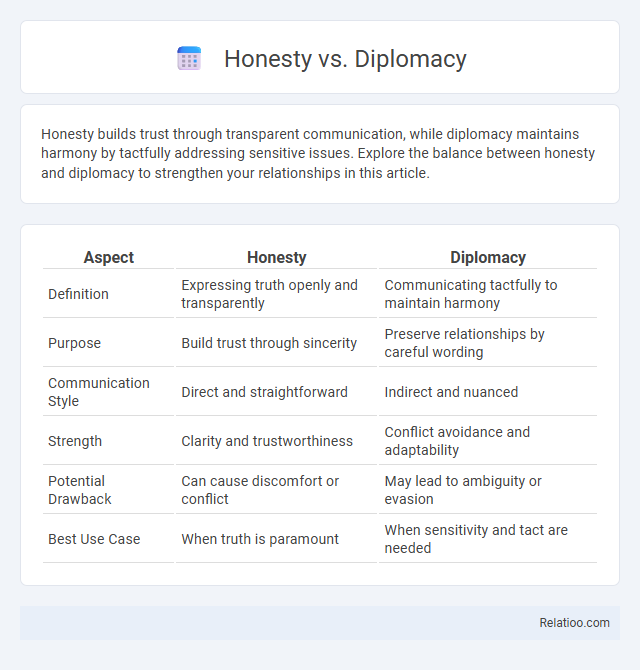Honesty builds trust through transparent communication, while diplomacy maintains harmony by tactfully addressing sensitive issues. Explore the balance between honesty and diplomacy to strengthen your relationships in this article.
Table of Comparison
| Aspect | Honesty | Diplomacy |
|---|---|---|
| Definition | Expressing truth openly and transparently | Communicating tactfully to maintain harmony |
| Purpose | Build trust through sincerity | Preserve relationships by careful wording |
| Communication Style | Direct and straightforward | Indirect and nuanced |
| Strength | Clarity and trustworthiness | Conflict avoidance and adaptability |
| Potential Drawback | Can cause discomfort or conflict | May lead to ambiguity or evasion |
| Best Use Case | When truth is paramount | When sensitivity and tact are needed |
Introduction to Honesty vs Diplomacy
Honesty involves communicating truthfully and transparently, fostering trust and integrity in relationships. Diplomacy emphasizes tactful and strategic communication to maintain harmony and avoid conflict, often balancing honesty with sensitivity. Understanding the delicate interplay between honesty and diplomacy is essential for effective interpersonal interactions and professional communication.
Defining Honesty: Speaking the Truth
Honesty involves consistently speaking the truth and presenting facts without distortion or omission, ensuring clear and authentic communication. Diplomacy balances truthfulness with tact to maintain positive relationships and avoid unnecessary conflict. Honest expression bridges these concepts by conveying genuine thoughts while respecting others' feelings and social contexts.
Understanding Diplomacy: Artful Communication
Understanding diplomacy involves mastering the art of communication that balances honesty with tact, ensuring messages are conveyed without causing offense. This skill requires recognizing the audience's perspective and choosing words that maintain trust while promoting cooperation. Effective diplomacy fosters constructive dialogue, enabling honest expression that respects both truth and relationships.
Historical Perspectives on Truth and Tact
Historical perspectives on truth and tact reflect varying cultural and philosophical valuations of honesty, diplomacy, and honest expression. Ancient Greek philosophers like Aristotle emphasized the virtue of honesty balanced by practical wisdom (phronesis) to navigate social interactions tactfully. Confucian ideals stressed harmonious relationships through sincere yet respectful communication, valuing both truthful expression and diplomatic sensitivity to maintain societal order.
Benefits of Honest Communication
Honest communication fosters trust and strengthens relationships by creating a foundation of transparency and sincerity. Balancing honesty with diplomacy ensures your message is clear without causing unnecessary conflict, enhancing mutual understanding and cooperation. Embracing honest expression allows you to convey your true feelings and intentions, promoting authenticity and reducing misunderstandings in both personal and professional interactions.
The Advantages of Diplomatic Approaches
Diplomatic approaches enable effective communication by balancing honesty with tact, fostering trust without causing offense. This method enhances relationship-building and conflict resolution by prioritizing empathy and clarity, which often leads to more constructive outcomes than blunt honesty. Employing diplomacy reduces misunderstandings and promotes collaboration in both personal and professional interactions.
When Honesty Can Hurt: Risks and Consequences
Honesty can sometimes cause unintended harm when blunt truths ignore others' feelings, risking damaged relationships or lost trust. Diplomacy offers a tactful way to communicate, balancing truth with empathy to preserve harmony without compromising integrity. Your ability to express honestly yet considerately ensures that communication remains constructive, minimizing conflicts and fostering mutual respect.
The Cost of Excessive Diplomacy: Losing Authenticity
Excessive diplomacy often leads to diluted messages, causing a significant loss of authenticity and hampering genuine communication. When individuals prioritize tact over honesty, the true intent and emotions behind their words become obscured, weakening trust and connection. Maintaining a balance between honesty and diplomacy is crucial to preserving integrity while fostering respectful interactions.
Striking the Balance: Practical Strategies
Striking the balance between honesty, diplomacy, and honest expression involves clear communication techniques such as using "I" statements to convey feelings without assigning blame. Practicing active listening helps to understand others' perspectives, fostering empathy alongside truthful dialogue. Implementing these strategies promotes trust and respectful interactions in both personal and professional relationships.
Conclusion: Choosing the Right Approach
Selecting between honesty, diplomacy, and honest expression depends on context, audience, and desired outcomes to balance transparency with sensitivity. Honesty fosters trust but may risk conflict, while diplomacy softens messages to maintain relationships without sacrificing core truths. Honest expression blends clarity and tact, offering a nuanced way to communicate effectively while preserving authenticity and respect.

Infographic: Honesty vs Diplomacy
 relatioo.com
relatioo.com